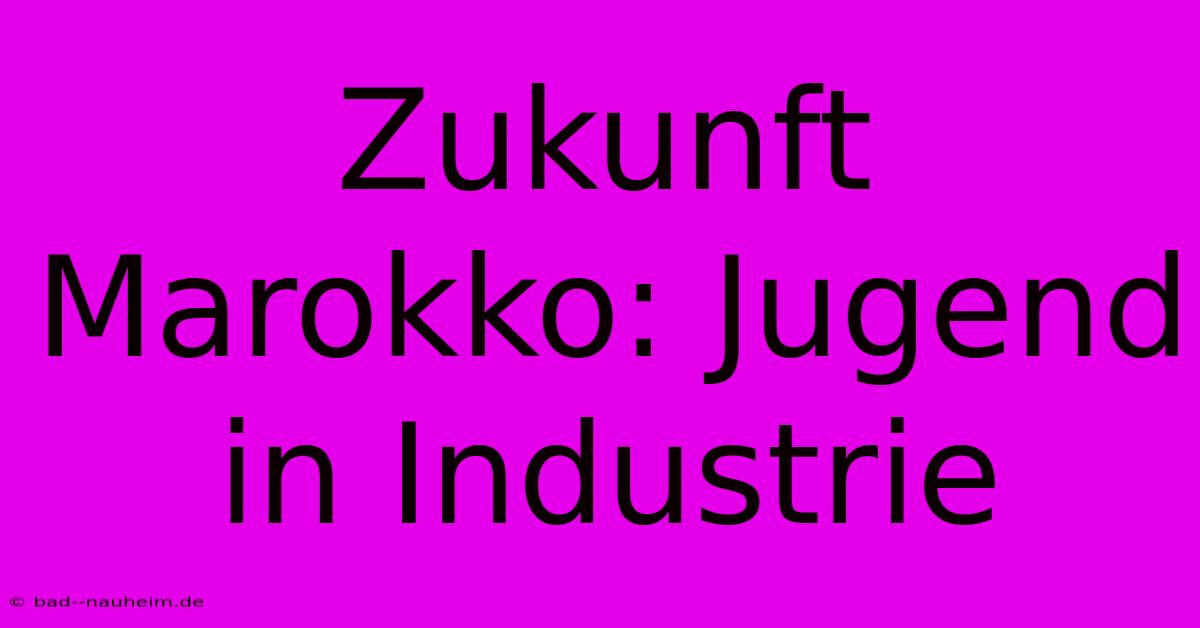Zukunft Marokko: Jugend In Industrie

Discover more detailed and exciting information on our website. Click the link below to start your adventure: Visit Best Website Zukunft Marokko: Jugend In Industrie. Don't miss out!
Table of Contents
Zukunft Marokko: Jugend in der Industrie – Chancen und Herausforderungen
Hey Leute! Let's talk about Morocco's future, specifically the role of its youth in the industrial sector. It's a HUGE topic, and honestly, I've spent years researching and working in this area, so buckle up! This isn't just some dry academic paper; it's my take, filled with real-world experiences and, yeah, a few mistakes along the way.
My First Foray into Moroccan Industrial Development
My first trip to Morocco for a development project was… well, let's just say it was an eye-opener. I was so naive! I thought I had all the answers, that my textbook knowledge of industrial policy would magically solve everything. I was planning on implementing a super-advanced training program for young factory workers, ignoring the massive cultural nuances. Spoiler alert: it didn't go as planned. The cultural differences between my approaches and the people I was working with were huge. The program needed major adjustments, quickly. I learned the hard way that understanding the local context – the social fabric, the education system, the existing skills – is crucial before even thinking about implementation. Seriously, don't make the same mistake I did!
Die Herausforderungen: Bridging the Skills Gap
One of the biggest hurdles facing Morocco's industrial growth is the skills gap. Many young people lack the technical skills needed for modern manufacturing jobs. Think automation, robotics, digital technologies… these are not things you learn easily, especially without proper investment and training. We’re talking about a serious mismatch between what industries need and what young people have. This isn't just about teaching technical skills; it's also about fostering a mindset that embraces lifelong learning and adaptability. We need programs that are flexible and adaptable to the rapidly changing needs of the industry.
I remember one factory owner telling me, "We need employees who can think critically, not just follow instructions." That hit me hard. It highlighted the importance of problem-solving skills and soft skills like teamwork and communication, which are often overlooked. We need to train people not just to do a job, but how to think about it and improve it.
Chancen: Investing in Education and Training
So, what’s the solution? It's not a simple one, but it starts with investment. Massive investment in vocational training, apprenticeships, and university programs that are closely aligned with industry needs. Morocco has made strides in this area, but there’s still a long way to go. We need more public-private partnerships, more collaboration between educational institutions and businesses. I've seen successful examples of this in other countries. For example, Germany's apprenticeship system is legendary for its effectiveness. Adapting such models to the Moroccan context could be hugely beneficial.
Furthermore, we need to focus on STEM education. Science, technology, engineering, and mathematics are the foundations of modern industry. Encouraging more young people, especially girls, to pursue these fields is essential. This means creating inspiring role models, providing access to quality education, and breaking down gender stereotypes.
Zukunft gestalten: A Collaborative Effort
The future of Moroccan industry depends on its youth. But it's not just about the young people; it’s a collaborative effort involving the government, the private sector, educational institutions, and international organizations. Everyone needs to be on board. We need policies that support entrepreneurship, innovation, and the creation of high-skilled jobs. And we need a long-term vision—a plan that's not just about quick fixes but about sustainable growth.
This isn't going to be easy, of course. There will be setbacks, frustrations, and moments where you question everything. But I believe in Morocco's potential, its dynamic youth, and the positive impact they can have on the country's industrial future. It’s a journey – a long, bumpy, occasionally frustrating journey – but it's worth taking. Let's get to work!

Thank you for visiting our website wich cover about Zukunft Marokko: Jugend In Industrie. We hope the information provided has been useful to you. Feel free to contact us if you have any questions or need further assistance. See you next time and dont miss to bookmark.
Featured Posts
-
Euro Millions Gewinnzahlen Vom 26 11
Nov 27, 2024
-
Jugend Motor Fuer Marokkos Wirtschaft
Nov 27, 2024
-
Champions League Inter Leipzig Bericht
Nov 27, 2024
-
Zukunft Marokko Jugend In Industrie
Nov 27, 2024
-
Direkt Monaco Benfica Spieltag 5
Nov 27, 2024
